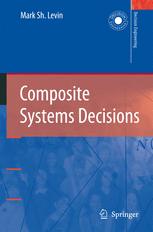

Most ebook files are in PDF format, so you can easily read them using various software such as Foxit Reader or directly on the Google Chrome browser.
Some ebook files are released by publishers in other formats such as .awz, .mobi, .epub, .fb2, etc. You may need to install specific software to read these formats on mobile/PC, such as Calibre.
Please read the tutorial at this link: https://ebookbell.com/faq
We offer FREE conversion to the popular formats you request; however, this may take some time. Therefore, right after payment, please email us, and we will try to provide the service as quickly as possible.
For some exceptional file formats or broken links (if any), please refrain from opening any disputes. Instead, email us first, and we will try to assist within a maximum of 6 hours.
EbookBell Team

5.0
48 reviewsComposite decisions consist of interconnected parts or subdecisions and correspond to a composite (composable, modular, decomposable) system. The composite decision approach extends the traditional paradigm of decision making of Herbert A. Simon, i.e. choice of the best alternative(s), and realizes a two-stage solving scheme: (a) the selection of alternatives as the best subdecisions or local decisions and (b) composition of the selected local decisions into a composite global decision while taking into account the quality of the local decisions and their compatibility.
Composite Systems Decisions describes an educational approach that is based on systems engineering and considered modular design of composite decisions. Divided into four parts, this book contains descriptions of basic systems approaches and examines basic ‘technological’ problems for composite systems, including: modular hierarchical design; multistage design; multistage planning; redesign/improvement/adaptation; evaluation; and, combinatorial evolution/development.
Applied researchers, undergraduate and graduate students, and practitioners in many domains will find Composite Systems Decisions a valuable reference. The basic systems problems, solving schemes, and applied examples contained in the book will also be of interest to various scientists (e.g., mathematicians, computer scientists, economists, social engineers, etc.).
The Decision Engineering series focuses on the foundations and applications of tools and techniques related to decision engineering, and identifies their relevance in ‘engineering’ decisions. The series provides an aid to practising professionals and applied researchers in the development of tools for informed operational and business decision making, within industry, by utilising distributed organisational knowledge.